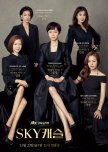
An Unforgiving Mirror of Ambition and Parental Pressure
SKY Castle is a hauntingly brilliant drama that dives deep into the darkest corners of parental ambition, academic pressure, and the fragile line between love and control. Set in a luxurious neighborhood where South Korea’s elite doctors and professors reside, the story follows four mothers—Han Seo Jin, Noh Seung Hye, Jin Jin Hee, and Lee Myung Joo—each fighting with silent desperation to secure their children’s futures at the top universities, especially Seoul National University. But what begins as a simple tale of academic competition quickly evolves into a complex web of secrets, psychological warfare, and emotional breakdowns.The arrival of Lee Soo Im and her nonconforming, more down-to-earth family disrupts the fragile ecosystem of SKY Castle. Soo Im’s presence challenges the other mothers, who are used to controlling every detail of their children’s lives. She questions not only their parenting styles but her own choices, especially as she begins to uncover what truly happened to the family that lived in her new home before her—the mysterious case of Myung Joo’s family and their ties to the chillingly calm college coordinator, Kim Joo Young.
What makes SKY Castle so powerful is how universally it speaks to the cost of success and the danger of tying a child’s worth to academic achievement. The mothers in this story are not villains, though they often act ruthlessly. They are women shaped by a system that equates prestige with happiness, and they have internalized that belief so deeply that they lose sight of the people their children actually are. Their motivations stem from fear—fear of failure, of losing status, of being seen as “less.”
Each character embodies a different response to this system: Han Seo Jin, with her double life and desperate need to maintain control; Noh Seung Hye, who begins to question everything she once believed; Jin Jin Hee, who blindly follows the advice of others just to stay in the race; and Lee Soo Im, who walks into this world like a quiet storm, full of compassion but slowly pushed to her own moral limits. And then there's Kim Joo Young, a character so unnervingly calm and calculated that she personifies the ruthless machinery behind the façade of academic excellence.
The children are, in many ways, the heart of the series. They are intelligent, talented, and entirely human—yet crushed under the weight of their parents' unrelenting expectations. Their anxiety, depression, rebellion, and even obedience feel raw and familiar. Watching them struggle isn’t easy, but it’s necessary.
SKY Castle isn’t just a drama—it’s a slow-burning psychological exploration of how ambition can erode relationships, ethics, and even love. It's not only about South Korea’s education culture, but a broader, more universal message: when success becomes everything, humanity is the first thing we lose.
The show is stylish, suspenseful, and brutally honest. It holds up a mirror to society and quietly asks, “What are we really doing to our children in the name of love?” The answer it gives back is not comfortable, but it is unforgettable.
Was this review helpful to you?

A Captivating Tale of Love and Emotional Struggles
Amidst a Snowstorm of Love is a Chinese drama that attempts to blend romance with political intrigue, set against the backdrop of a harsh and unforgiving world. While it has an undeniably beautiful premise, filled with grand landscapes, intricate relationships, and emotional twists, the series ultimately struggles with pacing issues, predictable plotlines, and underdeveloped characters. Despite these shortcomings, there are still moments of depth that give the series its charm.The premise of Amidst a Snowstorm of Love initially piques interest: a young couple whose love is tested by the conflicts around them, with elements of loyalty, betrayal, and sacrifice woven into their relationship. However, the show struggles with its execution of the plot. Early episodes set up a promising world filled with intrigue, but as the story progresses, the narrative begins to falter under its own weight.
One of the biggest issues with the plot is its predictability. While some twists are introduced, they often feel recycled from other similar dramas, and the audience can foresee the outcome well before it happens. This lack of surprise makes the series feel formulaic at times, undermining its potential to be a standout in the genre.
Additionally, the pacing in Amidst a Snowstorm of Love feels uneven. At times, the plot rushes through key emotional moments, leaving little room for the characters' development. In contrast, other episodes drag on, stretching out minor subplots that don’t add much to the overall narrative. This inconsistency affects the flow of the series, making it harder to stay fully invested in the characters’ journey.
The character development in Amidst a Snowstorm of Love leaves much to be desired. The protagonists, while charming in their own right, are often one-dimensional. The female lead, who starts off as strong and independent, becomes somewhat of a stereotype as the show progresses, relying on her love interest to define her role in the story. This regression in her character arc is disappointing, especially considering the potential for her to be a more layered and dynamic character.
The male lead, while fitting the classic "stoic hero" mold, also lacks depth. His motivations are unclear at times, and his emotional journey feels underexplored. While he has moments of vulnerability, these are few and far between, which leads to a disconnect with the audience. The chemistry between the leads is certainly present, but the lack of depth in their characters makes it difficult to fully invest in their relationship.
The supporting cast also suffers from underdevelopment. While some characters serve as interesting plot devices, they rarely transcend their basic roles. The lack of fleshed-out secondary characters limits the emotional impact of the show, as it feels as though many key relationships are only superficially explored.
Visually, Amidst a Snowstorm of Love shines. The cinematography is beautifully executed, with stunning landscapes and dramatic snow-covered scenes that complement the mood of the show. The use of sweeping landscapes helps to evoke the harshness of the world the characters inhabit, and the cinematography truly enhances the overall atmosphere of the drama. The attention to detail in the costume design and set decoration also helps transport the viewer into this visually immersive world.
However, despite the visual appeal, the beauty of the show can’t completely mask the flaws in the storytelling. The stunning scenery and elegant costuming sometimes feel like distractions rather than enhancements, especially when the plot falters or fails to engage. While the visuals are striking, they can't make up for the lack of strong narrative momentum.
Amidst a Snowstorm of Love attempts to tackle themes of love, loyalty, and sacrifice, but it often falls short in fully exploring these topics. The central relationship between the leads is undoubtedly the driving force of the series, but it often feels repetitive and stagnant. While the romance is heartfelt at times, the lack of emotional depth in both characters leads to a relationship that feels more superficial than profound.
The theme of loyalty is explored in fits and starts, with the characters’ personal struggles often overshadowing these deeper concepts. The constant back-and-forth between the leads and their external conflicts detracts from the emotional core of the story, making it difficult for the themes of loyalty and sacrifice to resonate fully.
The series does try to explore the broader implications of these themes, especially within the context of the political and social landscape, but the exploration feels underdeveloped. The drama misses opportunities to dig deeper into these issues, which could have added layers of meaning and emotional complexity to the story.
In conclusion, Amidst a Snowstorm of Love is a visually stunning series with a solid premise, but it fails to deliver on its potential. The plot is predictable and struggles with pacing issues, and the character development is lacking, especially for the leads. While the romance is charming at times, it never reaches the emotional depth required to make the series truly memorable.
The show’s beautiful cinematography and compelling setting are its strongest points, but these cannot fully compensate for the underwhelming narrative. Amidst a Snowstorm of Love is ultimately a mixed experience—there are flashes of brilliance, but the execution leaves much to be desired. It may appeal to fans of historical romance dramas, but those seeking a more nuanced and engaging storyline might find it lacking.
Was this review helpful to you?
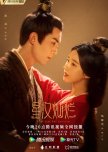
A Beautiful Journey of Love, Loyalty, and Personal Growth
Love Like the Galaxy is a heartwarming and beautifully crafted Chinese drama that masterfully blends elements of historical romance, family dynamics, and personal growth. Set against the backdrop of ancient China, this series captivates audiences with its enchanting storyline, rich character development, and stunning visuals. The drama offers a unique mix of romance, intrigue, and character-driven narrative that makes it a standout in the historical romance genre.At the heart of Love Like the Galaxy is a tender and complex love story that slowly unravels against the political and social tensions of the era. The series centers around the journey of the female lead, a young woman who navigates the intricate world of palace intrigue, family expectations, and personal desires. As she grows into herself, she finds love and companionship with a man who is not only her equal but someone who challenges her in ways that help her become a stronger person.
The plot is rich in emotional depth, with themes of loyalty, sacrifice, and self-discovery woven throughout. While the central romance is undeniably the driving force of the show, the series also explores important themes such as family loyalty, personal ambition, and the challenges faced by women in a historically patriarchal society. These layered narratives add complexity to the story, making it more than just a typical love story.
The pacing of Love Like the Galaxy is steady, allowing viewers to become deeply invested in the characters and their development. The slow-burn romance between the leads builds naturally over time, and the tension between them, mixed with moments of humor and vulnerability, makes their relationship feel organic and real. Each episode reveals more about the characters’ pasts, their motivations, and the challenges they must overcome, all of which contribute to their emotional growth.
One of the strongest aspects of Love Like the Galaxy is its focus on character development. The lead characters are exceptionally well-written, with deep personalities and arcs that evolve throughout the series. The female lead, in particular, is a standout character. She is not the typical damsel in distress but a strong, determined woman who refuses to conform to societal expectations. Her journey of self-empowerment and learning to balance love with duty is compelling and inspiring.
The male lead complements her perfectly, as he is not the typical aloof hero but a nuanced character with his own vulnerabilities and depth. The chemistry between the two leads is palpable, and their evolving relationship is heartwarming to watch. The romance between them is beautifully portrayed, with moments of tension, longing, and eventual mutual understanding that resonate deeply with viewers.
Supporting characters also contribute significantly to the narrative, each adding their own layer of complexity and depth to the story. The drama doesn’t rely solely on the main couple but gives ample room for other characters to grow and play pivotal roles in the development of the plot. This inclusivity makes the world of Love Like the Galaxy feel rich and multi-dimensional.
The performances by the lead actors are exceptional. The female lead brings a unique charm and strength to her role, while the male lead showcases a quiet intensity that perfectly matches his character. Their performances make the emotional beats of the story feel authentic and impactful.
Visually, Love Like the Galaxy is a stunning work of art. The cinematography is breathtaking, capturing the beauty of ancient China with lush landscapes, intricate set designs, and gorgeous costumes that transport viewers to another time. The attention to detail in the production design is evident in every scene, from the royal palace interiors to the scenic outdoor settings, creating a fully immersive experience.
The lighting is expertly used to evoke different moods, from the softness of intimate moments to the intensity of dramatic confrontations. The color palette, rich in warm and earthy tones, further enhances the historical atmosphere of the show while complementing the emotional undercurrents of the story.
The music score also plays a significant role in elevating the drama. The soundtrack beautifully complements the series' emotional tone, with traditional melodies that tie into the historical setting while also reflecting the personal struggles and triumphs of the characters.
At its core, Love Like the Galaxy is a love story that explores what it means to love in a world where societal norms and expectations often get in the way of personal desires. The romance is not just about passion but also about mutual respect, understanding, and sacrifice. The series delves into the complexities of love, showing how it can transform individuals and help them grow in ways they never imagined.
The drama also examines the role of family and loyalty, emphasizing how these elements can shape a person's choices and relationships. The tension between personal desires and familial duty is a key theme in the show, and it’s handled with nuance and sensitivity.
Another important theme explored in Love Like the Galaxy is the journey of self-discovery. The female lead’s evolution from a sheltered girl to a strong, independent woman who learns to navigate her own path is inspiring and empowering. Her story arc is one of the most compelling parts of the series, as it shows how love and personal growth can coexist.
In conclusion, Love Like the Galaxy is a beautifully crafted drama that offers more than just a simple love story. With its rich character development, engaging plot, and stunning visuals, the series delivers a heartfelt and immersive viewing experience. It is a show that not only explores the complexities of love but also the challenges of navigating life in a society bound by tradition and expectation.
The chemistry between the leads, the strong supporting cast, and the stunning historical setting all contribute to making Love Like the Galaxy an unforgettable watch. For fans of historical romance dramas, this series is a must-see, offering a mix of heart, humor, and compelling drama that will leave you eagerly awaiting each new episode.
Was this review helpful to you?

A Twisted Tale of Identity, Love and Deception
The Double is a Chinese drama series that skillfully combines elements of psychological thriller, mystery, and emotional drama. From its gripping storyline to its strong character development, the series has quickly earned a place in the hearts of viewers looking for an engaging narrative that keeps them questioning what's real and what isn't. With a focus on duality, identity, and deception, The Double is a show that digs deep into the complexity of human nature while offering a thrilling ride from start to finish.The central premise of The Double revolves around the concept of duality, both in terms of the characters and the events that unfold. The show follows the journey of two protagonists whose paths cross in an unexpected and often mysterious way. As the series progresses, the two characters find themselves in situations where their true selves, pasts, and motivations are constantly in flux, challenging both their perceptions and those of the audience.
At its core, the series is a psychological exploration of how far individuals are willing to go to protect their secrets and preserve their identities. The show masterfully blurs the lines between good and evil, creating morally gray characters that are both relatable and unpredictable. This tension between identity and deception is what drives the plot forward, keeping the audience hooked as they try to decipher the ever-evolving narrative.
The pacing of The Double is expertly crafted, with just the right balance of fast-paced action and slower, more introspective moments. The show takes its time to develop its characters and the emotional weight of their actions, allowing for deep character exploration. However, it never feels like the plot drags. The suspense is carefully managed, and the twists and turns never feel forced or contrived. Each revelation comes at the perfect moment, keeping viewers constantly on edge and invested in the outcome.
One of the standout features of The Double is its rich character development. Both protagonists, as well as the supporting cast, are written with depth and complexity. The characters are not mere archetypes but are multi-dimensional individuals with their own motivations, insecurities, and desires. This makes their journeys all the more compelling as viewers are invited to watch their growth and transformation throughout the series.
The lead actors deliver exceptional performances, particularly in their portrayal of internal conflict. The emotional depth they bring to their respective roles makes their characters feel authentic and grounded, even in the midst of extraordinary situations. The chemistry between the two leads is palpable, and their interactions form the emotional core of the show. Whether they are working together or at odds with each other, their relationship remains compelling and engaging, driving the emotional tension of the story.
Supporting characters are also well-developed, each adding layers to the main storyline and contributing to the overarching themes of identity, deception, and personal growth. The writers do an excellent job of making even secondary characters important to the narrative, ensuring that every character has a purpose and a reason for being part of the story.
Visually, The Double is a feast for the eyes. The cinematography is stunning, with each frame carefully composed to enhance the storytelling. The use of lighting is particularly effective in setting the tone for each scene, often creating a sense of unease or mystery. The series utilizes shadows, reflections, and clever camera angles to symbolize the duality of the characters' lives and the inner turmoil they face. These visual cues further deepen the thematic exploration of identity and the contrasts between appearances and reality.
The production design is equally impressive, with attention paid to every detail of the set design and costumes. Whether in an urban setting or a more secluded environment, the locations chosen for each scene complement the mood and atmosphere, enhancing the overall experience. The music score also plays a significant role in creating tension and building emotion, with the soundtrack blending seamlessly with the visual elements to heighten key moments.
One of the most compelling aspects of The Double is its exploration of identity. The series poses important questions about who we are, who we choose to become, and how much of our true selves we are willing to hide from others. As the characters wrestle with their pasts and face situations that force them to question their beliefs and motivations, the show delves deep into themes of self-discovery and the consequences of living a life of secrecy.
The psychological tension in The Double is a constant undercurrent throughout the series. The characters’ internal struggles are mirrored by the external conflicts they face, creating a layered narrative that is both emotionally resonant and intellectually stimulating. The show challenges viewers to consider the nature of truth and how perception can often be manipulated. It also explores the lengths to which people will go to protect their own identities, even when doing so comes at the cost of their relationships or their peace of mind.
The moral ambiguity in the show is another standout feature. There are no clear-cut heroes or villains, and each character's actions are influenced by a complex set of motivations that make them more human and relatable. This adds an extra layer of complexity to the narrative, making it a more thought-provoking experience.
In conclusion, The Double is a highly engaging and thought-provoking Chinese drama that offers a perfect blend of mystery, suspense, and emotional drama. Its exploration of identity, deception, and the human psyche makes it a standout in the genre. The well-crafted plot, strong performances, and stunning visuals come together to create an unforgettable viewing experience. The series keeps the audience on the edge of their seats, constantly questioning the truth and wondering what will happen next.
For those who enjoy intricate, character-driven narratives that tackle deep psychological themes, The Double is an absolute must-watch. With its well-paced story, strong character arcs, and a compelling mystery that unfolds with each episode, it’s a series that will leave you eagerly anticipating what comes next, long after the final credits roll.
Was this review helpful to you?

A Heartfelt Journey Through Life, Death, and Second Chances
Tomorrow is an emotionally-charged drama that explores the delicate balance between life and death, the choices we make, and the deep impact that every life has on those around it. A fascinating mix of fantasy, supernatural elements, and deeply human struggles, it takes viewers on a journey through the darkness that often surrounds us, while offering a glimmer of hope, healing, and second chances.The story revolves around Choi Joon Woong, a young man who unexpectedly ends up working for a special division of the afterlife known as the “Specialized Crisis Management Team.” This team helps guide souls who are at risk of taking their own lives, intervening in moments of extreme despair and preventing them from giving up on life. Joon Woong, who finds himself in a world that straddles the line between life and death, is both an observer and an active participant in these critical moments, and the drama beautifully explores the weight of his journey.
What sets Tomorrow apart from other supernatural dramas is its unique premise: a team of “grim reapers” who are tasked with preventing suicides. Instead of the usual focus on otherworldly battles or power struggles, the series digs deep into the emotional and psychological toll that the characters carry with them. The characters, especially the ones on the crisis management team, are multi-dimensional and often burdened by their past mistakes, regrets, and failures. Their efforts to help others are deeply intertwined with their own healing and growth, making every story that unfolds within each episode resonate on a personal level.
The protagonist, Choi Joon Woong, played by Rowoon, is someone who is thrown into this surreal world with no clear understanding of his role. His compassion and sense of justice are immediately evident, making him relatable and endearing. Joon Woong’s growth as a character is fascinating, as he learns not only how to intervene in the lives of those on the brink of despair but also how to confront his own past traumas and fears. His interactions with the rest of the team, including the experienced grim reaper Im Ryung Gu (played by Kim Hae Sook) and the cold but caring grim reaper Goo Ryun (played by Yun Ji On), allow for a nuanced exploration of relationships, self-worth, and redemption.
The themes of mental health, grief, and loneliness are central to Tomorrow. It doesn’t shy away from the dark and often painful realities that many people face, yet it balances these moments with messages of hope, the possibility of change, and the value of empathy. The series paints a picture of how fragile human life can be, but also how much power each person has in determining their future, especially when supported by those who truly care. The crisis management team's interventions offer a sense of solace, reminding us that no matter how dire the circumstances, there is always room for second chances.
The drama doesn’t just rely on its emotional depth; it also offers moments of humor and lightness that prevent it from becoming overly heavy. The dynamic between the characters adds warmth to the narrative, especially as Joon Woong begins to form deep bonds with his colleagues and the people he’s trying to save. The balance of humor and drama keeps the tone engaging and prevents it from becoming too somber.
What’s also notable is the visual aspect of Tomorrow. The use of lighting, colors, and imagery enhances the fantastical elements while maintaining an emotional grounding that keeps the focus on the characters and their struggles. The settings themselves are often symbolic—places where life and death intersect—and add to the surreal atmosphere that the drama strives to create.
In conclusion, Tomorrow is not just a supernatural drama; it’s a touching exploration of life, death, and everything in between. It captures the complexity of the human experience, showing how even in the darkest moments, there is a flicker of light. Through its mix of fantasy, emotion, and characters who feel real and flawed, Tomorrow reminds us that every day is a chance for change, growth, and new beginnings.
Was this review helpful to you?
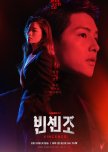
A Dark Comedy of Justice and Revenge
Vincenzo is a thrilling, genre-bending drama that expertly blends action, crime, romance, and dark comedy into a unique narrative that’s as stylish as it is smart. At its core, it’s a story of revenge and justice, but it’s wrapped in a layer of wit, charm, and complex characters that elevate it far beyond a typical mob drama.The series follows Vincenzo Cassano, a talented lawyer and consigliere to the mafia, who is forced to return to South Korea after a power struggle within the organization. His primary goal is to recover hidden gold that’s buried beneath a corporate building, but what ensues is far from just a treasure hunt. As Vincenzo navigates his new life in Seoul, he is forced to confront the corrupt, greedy world of high-powered corporations and the individuals who benefit from it. What stands out is the central theme of justice—the blurred line between right and wrong—and the way Vincenzo balances his mafia roots with a moral code that, though unusual, is ultimately rooted in fairness.
Vincenzo, played brilliantly by Song Joong Ki, is a character whose charm lies in his unapologetic cynicism and ruthless methods. He’s suave, calculating, and doesn’t hesitate to use his connections in the criminal world to deal with wrongdoers. But beneath this cold exterior is a man who is deeply affected by the corruption and greed that pervades society. His actions, while often violent, are driven by a need for justice in a world that seems to lack it. What makes him even more compelling is his moral ambiguity—he’s not a typical hero, but someone who works in the gray areas between right and wrong, making his actions all the more fascinating.
The contrast between Vincenzo and Hong Cha Young, a passionate lawyer played by Jeon Yeo Bin, adds a refreshing layer of dynamism to the series. While Vincenzo represents the world of shadows and mafia, Cha Young embodies the legal world, fighting for justice in a more traditional sense. Their partnership is built on mutual respect, but it’s also full of tension and banter that adds humor to the darker elements of the story. Together, they make a formidable team, and their dynamic is one of the driving forces of the series.
The pacing of Vincenzo is another standout feature. The show expertly balances action-packed sequences with moments of humor and emotional depth. There are moments of intense violence, but they’re often followed by absurdly funny scenes that catch the audience off guard. This blend of dark humor and violence makes the show feel fresh and unpredictable. It’s also a reflection of Vincenzo’s character—someone who navigates life’s harshest realities with a cynical yet humorous perspective.
The supporting characters also bring richness to the show, particularly the residents of Geumga Plaza, the building that Vincenzo becomes embroiled in. These quirky, endearing characters add a lighter tone to the series, even when the stakes are high. They provide comic relief, but they also play pivotal roles in the unraveling of the story, creating a perfect balance between the drama’s darker themes and its more light-hearted moments.
Vincenzo is a complex tale about the pursuit of justice in a corrupt world, with a protagonist who’s both ruthless and charming, and a plot that never stops keeping you on the edge of your seat. It’s a perfect blend of thrilling action, smart dialogue, and emotional depth, with a strong dose of dark humor to keep things from getting too heavy. It’s not just about revenge—it’s about using whatever means necessary to dismantle a system that’s built on greed, corruption, and manipulation. In the end, Vincenzo teaches us that sometimes, justice requires a little bit of crime.
Was this review helpful to you?

Dreaming of Fate, Fighting for Justice
While You Were Sleeping is not just a romance, not just a legal drama, and not just a supernatural thriller—it is the seamless intersection of all three, carried by its tender-hearted characters and a narrative that constantly reminds us how fragile, yet powerful, our choices can be.The story follows Nam Hong Joo, a young woman who has the unsettling ability to see future events in her dreams—most of which are tragic. These dreams become her burden until she meets prosecutor Jung Jae Chan, who unexpectedly gains the same ability. Alongside rookie police officer Han Woo Tak, the trio forms an unintentional team of justice: using their visions to prevent disasters, save lives, and uncover truth in a legal world full of corruption and cold logic.
At the heart of the series lies the tension between fate and free will. Can we change the future, or are we merely watching it unfold helplessly? Every episode plays with this idea, showing how small, almost insignificant actions ripple outward, altering destinies. It's not just about seeing the future—it’s about the courage it takes to try to change it.
The romance between Hong Joo and Jae Chan grows slowly but sincerely. There’s a purity in the way their relationship is portrayed—built not on dramatic declarations, but on quiet gestures, shared fears, and a deepening trust. Their connection feels inevitable, not because fate decided it, but because they continuously choose each other, over and over again.
But perhaps one of the most emotionally resonant aspects of While You Were Sleeping is its portrayal of justice—not as a cold concept, but as something deeply human. Jae Chan’s growth as a prosecutor is not about becoming more confident, but more compassionate. He learns that protecting people isn’t always about proving guilt; sometimes, it's about understanding pain. The series doesn’t shy away from showing the imperfections of the legal system, yet it offers hope through its characters—people who still choose to fight for what’s right, even when it costs them.
Han Woo Tak, often the quiet anchor of the trio, adds a layer of bittersweet depth to the narrative. His unwavering integrity, hidden feelings, and quiet strength make him one of the most memorable second leads in recent K-drama history. He’s a gentle reminder that sometimes the greatest love stories are the unspoken ones.
Visually, the show plays with dreamlike tones—soft lighting, symbolic imagery, and music that lingers like the memory of a dream. These stylistic choices mirror the emotional flow of the series, always balancing tension with tenderness.
In the end, While You Were Sleeping asks us to believe—in the power of choice, in the importance of empathy, and in the idea that no matter how dark the vision may be, there’s always room to hope. It’s a story for those who’ve felt powerless in the face of life’s twists, and for those who needed a reason to believe they can still change what’s ahead.
Was this review helpful to you?
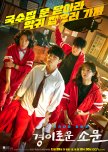
The Uncanny Counter: Hunting Demons, Healing Wounds
At first glance, The Uncanny Counter might seem like a typical supernatural action series—demon hunters with special abilities, a fight between good and evil, and a touch of fantasy. But beneath its thrilling surface lies a much deeper narrative: one about loss, grief, found family, and the personal battles we fight inside ourselves.The series revolves around a group of “Counters,” seemingly ordinary people working at a noodle shop, who secretly hunt down evil spirits that prey on humans. These spirits possess people with murderous tendencies, feeding on their darkness. Each Counter has been chosen after a near-death experience and gifted with powers by the afterlife realm known as Yung. Their purpose is not only to exorcise these demons, but also to guide lost souls to peace.
At the heart of the story is So Mun, a physically disabled high school student whose life changes forever after he’s chosen to become a Counter. Still grieving the tragic loss of his parents, So Mun brings a raw emotional honesty to the team. His transformation from a quiet, angry teen into a determined, empathetic protector is one of the most touching arcs of the series. His pain fuels his strength, but he learns—through the support of his new family—that healing doesn't come from revenge alone.
What makes The Uncanny Counter stand out is the emotional richness of its characters. Each Counter carries personal trauma: Ga Mo Tak, a former cop with memory loss; Do Ha Na, who can read memories through touch and struggles with solitude; and Choo Mae Ok, a warm-hearted healer mourning her dead son. Their bond feels genuine, forged not just in battle but through shared pain and mutual care. They're not superheroes—they’re survivors.
The antagonists in the show aren’t just monstrous spirits—they are deeply symbolic. They represent the corruption, violence, and cruelty that exist in everyday society. Greedy politicians, abusive families, broken systems… the demons possess those who already live in moral darkness. This blurred line between the natural and the supernatural gives the story weight; the evil isn't just from another realm—it’s something we allow to grow in our world.
Visually, the series balances intense action with moments of stillness and reflection. Fight scenes are stylized but not excessive; they serve the story, not the other way around. And the soundtrack, often emotional and haunting, stays with you long after the episode ends.
In the end, The Uncanny Counter is less about battling demons and more about reclaiming humanity. It reminds us that strength is born in our scars, that family is who stands beside you in your worst moments, and that justice sometimes needs ordinary people to do the extraordinary. It’s a story of resistance—not just against evil spirits, but against the quiet violence of hopelessness.
Was this review helpful to you?
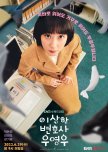
Extraordinary Attorney Woo Review: A Heartwarming Yet Formulaic Legal Drama
Extraordinary Attorney Woo addresses an important societal issue: the challenges faced by individuals with autism spectrum disorder (ASD) in the professional and social realms. The show follows Woo Young Woo, a brilliant young attorney with autism, as she navigates the legal world and deals with the societal obstacles that arise due to her condition. While the series sheds light on the difficulties and triumphs of individuals with ASD, its critique of society often feels superficial, leaving the viewer with a sense that the representation could be deeper and more nuanced.The central theme of the show revolves around Woo’s unique abilities and how they make her stand out, particularly in her career. Woo is a brilliant attorney, capable of solving complex legal problems with her eidetic memory and logical reasoning. However, the series frequently portrays society’s perception of her as "different" as the main source of conflict. She faces discrimination, isolation, and prejudice in both her personal and professional life, particularly at the prestigious law firm where she works. While the series does attempt to show the positive impact of Woo’s success and her eventual acceptance by her colleagues, it often resorts to a simplistic resolution where Woo’s uniqueness is seen as something to be celebrated only once she proves herself through her accomplishments.
This focus on Woo’s exceptionalism, while empowering to an extent, highlights a problematic narrative: the idea that individuals with disabilities or neurodivergence must achieve extraordinary feats in order to be accepted or respected. The show’s portrayal of Woo overcoming her social and professional barriers is uplifting, but it doesn’t deeply engage with the idea that society itself must change to accommodate and value people who are different, regardless of their achievements. It raises the question of whether people with autism must always be "extraordinary" to gain acceptance, or whether society should learn to embrace neurodiversity without requiring exceptional performances as a prerequisite.
Furthermore, the romantic subplot between Woo and her colleague Lee Jun Ho (played by Kang Tae Oh) offers a tender and warm exploration of Woo’s emotional growth. However, this relationship sometimes feels secondary to her professional journey and doesn’t fully address the complexities of intimacy and emotional connection for someone with autism. While Jun Ho’s support is vital, the show doesn’t delve deeply into how Woo navigates the intricacies of romance, leaving the portrayal of love somewhat underexplored.
In terms of broader societal critique, the show offers a limited view of acceptance. The idea that Woo’s differences are only acknowledged and embraced once she proves herself as an exceptional lawyer reinforces the notion that societal acceptance of neurodivergent individuals often comes with a condition: excellence. This perspective can be limiting because it suggests that people with autism or other disabilities need to "earn" their place in society, which can reinforce harmful stereotypes about worth and capability.
Additionally, the show falls short in its exploration of the day-to-day challenges that people with autism face. While Woo’s character is framed as a "genius," it sometimes glosses over the emotional and social struggles that come with living on the spectrum. The narrative rarely addresses how Woo feels about her condition beyond her professional success, missing the opportunity to explore her emotional vulnerabilities and how she deals with rejection or misunderstanding on a deeper level.
In conclusion, while Extraordinary Attorney Woo makes an important contribution by featuring a protagonist with autism and by offering a glimpse into the challenges faced by neurodivergent individuals, its portrayal of society and the issues surrounding neurodiversity remains somewhat simplistic. The show touches on themes of acceptance and inclusion, but it doesn't fully challenge societal norms or provide a deep, critical look at the barriers that individuals with autism often encounter. It remains a feel-good story that celebrates Woo’s success, but in doing so, it risks reinforcing the idea that acceptance can only be earned through extraordinary achievements.
Was this review helpful to you?
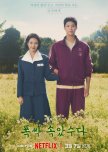
Bittersweet Youth Under Jeju Skies
When Life Gives You Tangerines doesn’t shout its story—it whispers it, gently, like the ocean breeze that moves through the orange groves of Jeju Island. In a world filled with flashy dramas and overstated emotions, this series chooses a quieter, more honest path. And in doing so, it resonates all the more deeply.Set against the tranquil, almost poetic backdrop of Jeju, the series follows Go Mi Joo, a high school student navigating the in-between space of adolescence—no longer a child, but not quite ready for the grown-up world either. What sets this story apart isn’t a grand plot twist or heavy melodrama, but its commitment to truth: the truth of rural life, of silent struggles, and of emotions that are often too complex for words.
Mi Joo is not a dramatic heroine. She is ordinary, and that’s what makes her extraordinary. Her quiet strength, the way she hides her pain behind a steady face, the flickers of joy she finds in mundane things—these all reflect the kind of character writing that trusts its audience to feel rather than be told. Her friendship with her classmates, the tension with her family, and the subtle evolution of her inner world all speak to the universal themes of growing up: confusion, loneliness, and longing for something more.
There’s a stillness to this drama that feels almost therapeutic. Scenes linger longer than usual, the camera taking its time to let the surroundings breathe—whether it's the golden light of a tangerine orchard, the sound of the waves, or the quiet of a school hallway. It mirrors the internal pace of its characters, especially Mi Joo, whose world is both small and vast at once.
Emotionally, When Life Gives You Tangerines captures the bittersweet essence of youth—when dreams are big but resources are small, when emotions are raw but expression is limited. There’s something achingly beautiful about the way the show portrays poverty—not as a plot device, but as a daily reality that shapes relationships, ambitions, and choices. Yet it never slips into misery. There’s joy here, too—found in laughter with friends, moments of quiet connection, and the resilience that blooms in even the hardest soil.
As of now, the story is still unfolding, and its pace is gentle—almost like life itself. There are no villains here, only people trying to do their best with what little they’ve been given. And maybe that’s the point. The tangerines life gives aren’t always sweet. But they’re real, and sometimes, that’s enough.
Was this review helpful to you?
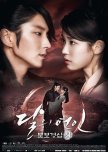
A Visually Stunning Saga of Love and Betrayal with a Heartbreaking Lack of Closure
Moon Lovers: Scarlet Heart Ryeo stands as one of the most iconic and emotionally charged historical K-dramas, captivating audiences worldwide with its intricate storyline, compelling characters, and visual splendor. The drama, based on the Chinese novel Bu Bu Jing Xin, follows Hae Soo (played by IU), a modern-day woman who is transported back to the Goryeo Dynasty, where she becomes entangled in the tumultuous world of palace politics and romance. Despite its massive popularity and its emotional resonance, Moon Lovers leaves viewers with a bittersweet sense of longing, particularly due to its unresolved conclusion and the lack of a second season.The world of Moon Lovers is beautifully realized, immersing the audience in the lavish and politically charged atmosphere of the Goryeo Dynasty. The show masterfully combines historical accuracy with dramatic flair, presenting a world filled with stunning palaces, elegant costumes, and a constant sense of danger and intrigue. The political conflicts, rivalries, and power struggles among the royal family add to the tension, making the world-building essential to the drama's narrative. While the historical context provides depth and stakes, the show often leans heavily into the melodrama, sometimes to its detriment.
One of the greatest strengths of Moon Lovers is its cast. The lead performance by IU as Hae Soo is exceptional. As a modern-day woman who suddenly finds herself in the Goryeo Dynasty, Hae Soo is initially innocent and naive but gradually evolves into a woman who must navigate love, betrayal, and palace intrigue. IU’s ability to capture Hae Soo’s vulnerability, strength, and growth is truly impressive. Her emotional range makes Hae Soo’s journey feel deeply personal and relatable, allowing viewers to empathize with her struggles. Despite the character’s somewhat passive role in the political turmoil around her, IU’s portrayal of Hae Soo remains captivating, grounding the story in her emotional perspective.
Lee Joon Gi as Wang So is equally remarkable. His portrayal of the "Wolf Dog" prince, marked by his rough exterior and traumatic past, adds layers of complexity to a character that could have easily been a typical romantic lead. Wang So’s transformation from a feared and misunderstood figure to a man capable of love and sacrifice is one of the most compelling character arcs in the drama. His chemistry with Hae Soo is undeniable, and their love story, filled with both passion and tragedy, is the emotional heart of the series. Lee Joon Gi’s performance is a masterclass in portraying vulnerability and strength, and his ability to convey the pain and longing of his character elevates the drama to another level.
The supporting cast also delivers memorable performances. Kang Ha Neul as Wang Wook brings a tragic dimension to his character. Initially, Wang Wook is the charming and noble prince who falls in love with Hae Soo, but as the story progresses, his jealousy and ambition begin to undermine his relationships. Kang Ha Neul’s portrayal of Wang Wook’s moral descent is subtle yet powerful, making him a fascinating figure. The other princes, including Wang Jung (played by Baekhyun of EXO) and Wang Yo (played by Kim San Ho), each contribute to the complex royal dynamics, offering a range of emotional and political struggles that add depth to the drama.
However, while the performances are largely exceptional, the characters themselves can sometimes feel more like archetypes rather than fully fleshed-out individuals. While the princes' personalities are distinct, their motivations often feel exaggerated or unclear. Many of the political and romantic conflicts revolve around their relationships with Hae Soo, but the show occasionally misses the opportunity to explore these characters beyond their interactions with her. The supporting characters, while interesting, sometimes serve more as plot devices than fully developed figures in their own right.
The plot of Moon Lovers is undeniably engaging, filled with twists, turns, and emotional moments that keep the audience hooked. The love triangle between Hae Soo, Wang So, and Wang Wook forms the emotional backbone of the drama, with moments of intense passion, betrayal, and heartbreak. At the same time, the series explores the darker side of the royal court, with themes of power, ambition, and the price of loyalty. The tension between love and duty is a central theme, as characters are forced to choose between their personal desires and their responsibilities to their families or the throne.
Despite the engaging narrative, the pacing of Moon Lovers can be uneven at times. Early episodes focus heavily on establishing the characters and their relationships, while later episodes delve into the political and familial conflicts within the royal family. However, the series can occasionally feel overstuffed with subplots, making it difficult for some storylines to get the attention they deserve. Some arcs are rushed, while others drag on unnecessarily, leaving the pacing a bit uneven. The political intrigue, though intriguing, can become convoluted at times, and certain elements of the plot feel forced for the sake of drama.
One of the most frustrating aspects of Moon Lovers is its ending. The conclusion is nothing short of heartbreaking, leaving viewers with a sense of unfinished business and unfulfilled potential. The story of Hae Soo and Wang So’s love, filled with intense emotion and sacrifice, comes to an abrupt and tragic end, leaving many questions unanswered. The lack of closure, especially regarding the fate of certain characters and the broader political situation in the Goryeo Dynasty, feels like a missed opportunity. The potential for a second season to tie up loose ends and provide a more satisfying conclusion is undeniable, and the fact that the show did not receive a follow-up has left many fans disillusioned. It’s hard not to feel that Moon Lovers would have benefited from further exploration of the characters' journeys and the world they inhabit, especially given the complexity of the plot and the emotional stakes.
The absence of a second season is a personal disappointment for many, myself included. The ending left too many emotional and narrative threads hanging, and as much as the first season delivered an unforgettable emotional experience, it felt incomplete. The promise of future developments, both for the characters and the story, was too tantalizing to ignore, and the lack of closure leaves a sense of longing that is difficult to shake.
In conclusion, Moon Lovers: Scarlet Heart Ryeo is a visually stunning, emotionally charged drama that captivates with its performances, rich world-building, and powerful themes of love, betrayal, and power. The chemistry between IU and Lee Joon Gi, paired with the exceptional performances of the supporting cast, elevates the drama and provides a compelling emotional journey. However, the series is not without its flaws. The pacing can be uneven, and certain character arcs feel underdeveloped or forced. The political intrigue, while intriguing, sometimes becomes convoluted, and the story could have benefited from a more focused approach.
Most importantly, the lack of a second season is a significant disappointment. The unresolved ending leaves many viewers feeling unfulfilled, and the absence of a continuation deprives the story of the potential to explore its characters and themes more deeply. As a fan of Moon Lovers, I can’t help but feel that the drama deserved more. Its complex and emotional narrative deserved a proper conclusion, and the characters deserved a chance to evolve further. The drama remains one of the most unforgettable K-Dramas, but it also leaves a lingering sense of what could have been.
Was this review helpful to you?























